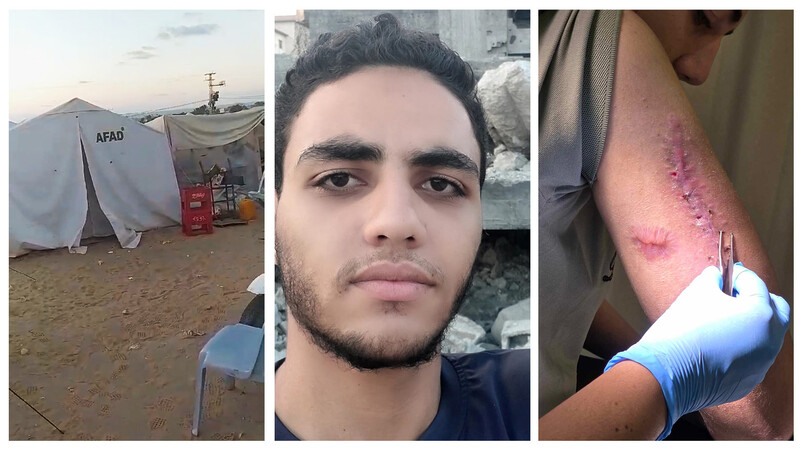The Electronic Intifada 4 September 2024

From L to R: Yazan Abou Ali’s tent in the Nuseirat camp following his displacement from Gaza City; a selfie of Yazan in Gaza City; and stitches are removed from Yazan’s right arm and hand following surgery.
The Electronic IntifadaI am writing this story from Nuseirat camp, in the central Gaza Strip. I type on my laptop and phone with my left hand now. On 9 October 2023, I lost sensation in my right hand following an Israeli bombing.
That day, my mother had asked me to go to the market to buy some eggs.
I walked from our home in the Intelligence Towers (al-Ibraj al-Mukhabarat) in northern Gaza City to the market.
This was when you could still buy eggs. And even though there were bombings, we knew we had to eat, and the market was crowded with others buying fruit and vegetables.
On the walk home, I heard an explosion and screaming. I fell to the ground and saw that others had fallen to the ground around me as well. Then, I lost consciousness. When I woke up it was a day later and I was at the hospital. I was shocked to discover that I couldn’t move my hand.
Shrapnel was embedded up and down my arm. The pain was so intense that I felt like dying. The doctor told me that all the tendons and nerves in my hand were severed and that I would have to undergo an urgent surgery to remove the shrapnel.
After a week, I underwent surgery. Even in recovery, I could not move my hand.
Before October 2023, I was studying information technology at the Islamic University of Gaza. My dream was, and still is, to be a senior programmer at Google. I wondered how hard this would be if I never recovered the use of my hand.
One massacre after the next
The loss of feeling in my hand was just the beginning of this new reality.
On 12 October, Israel had bombed the Intelligence Towers. Thank God my family had already evacuated, and we did not suffer any deaths.
Yet during that time, after my release from the hospital, we slept on the sidewalk. We didn’t even have a tent until a man gave us a small tent that could barely fit my family of eight: me, my mother and father, and my five brothers.
Since October, we’ve been displaced seven times: to Khan Younis, to Rafah, to Nuseirat, and then back again.
Our living situation is still very bad. We cannot find fresh water to drink and we go long distances to fill the water jugs. We are also under constant threat from the enemy.
In June, I was back at the hospital getting treatment for an ear and nose infection. This time, I sought care at al-Awda hospital in Nuseirat.
It was a day that I do not like to describe. Israel killed hundreds of people that day in Nuseirat, and I saw burned bodies, bloody bodies and people screaming.
Gaza is one of the world’s most challenging environments to live in. Every day is a test of resilience and perseverance, and the war and instability have shaped every aspect of my life.
I try to look at my injury in my hand as a strength, a reminder that I am strong and refuse to be broken. I don’t want my injury to define me.
Every day I work toward recovery and mobility to try and turn my pain into purpose.
The journey is not easy, but it is one I embrace with courage and hope.
Yazan Abou Ali is a computer programmer in Gaza.


